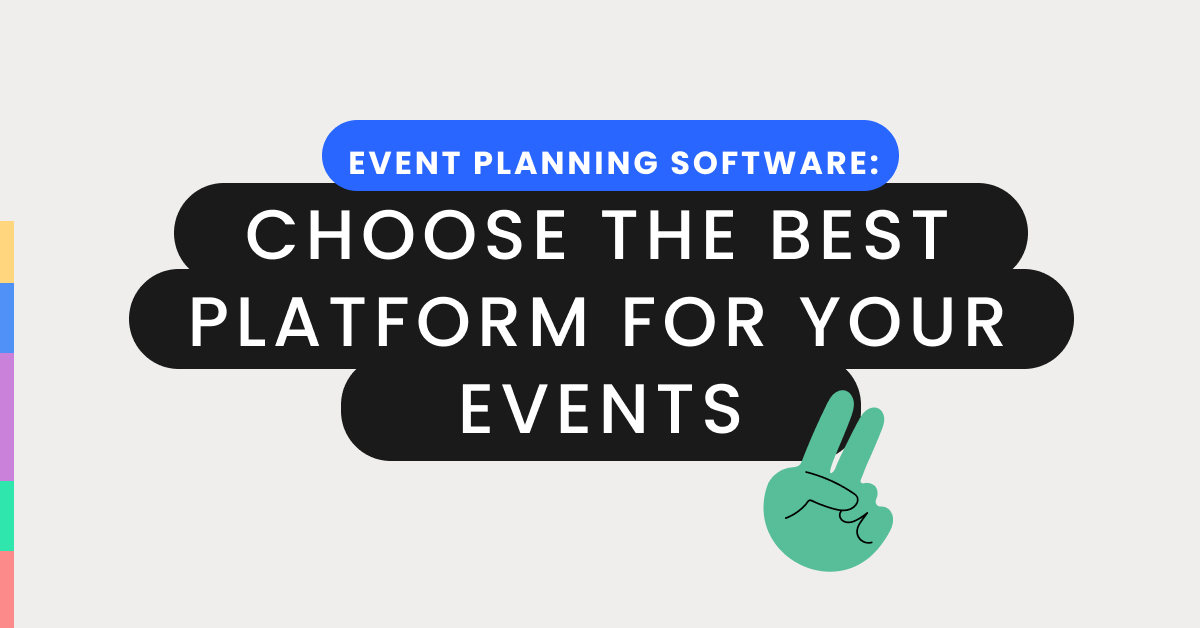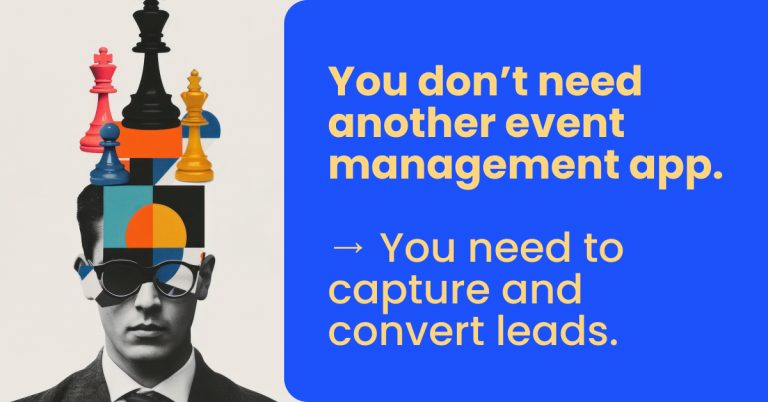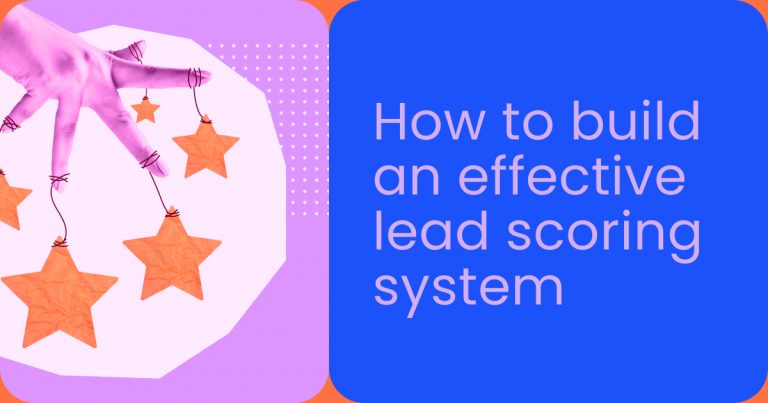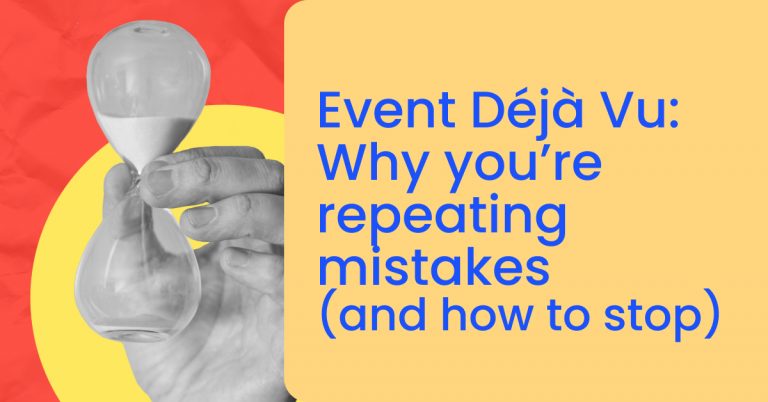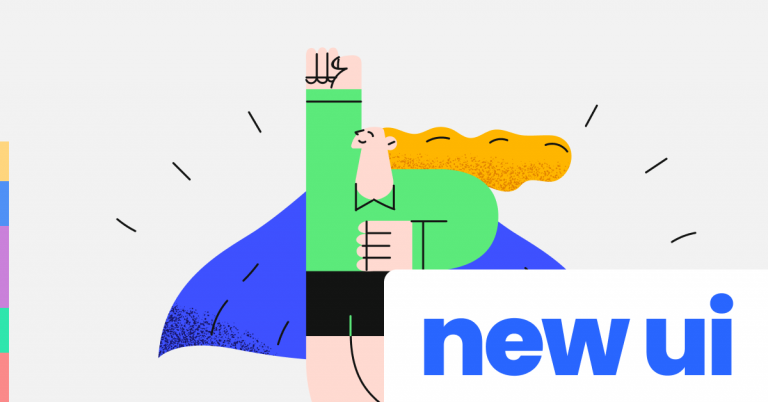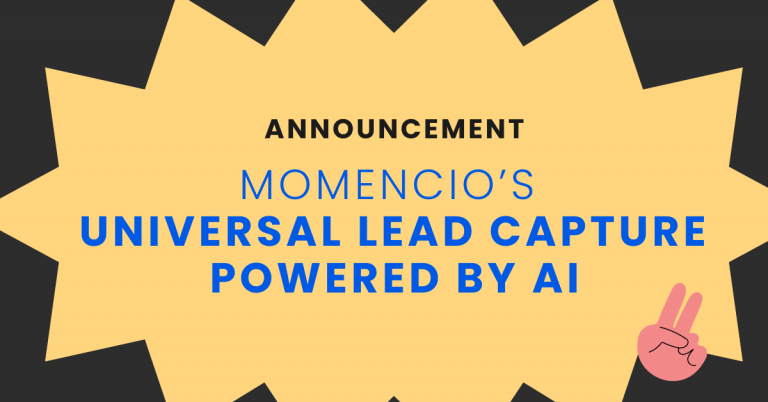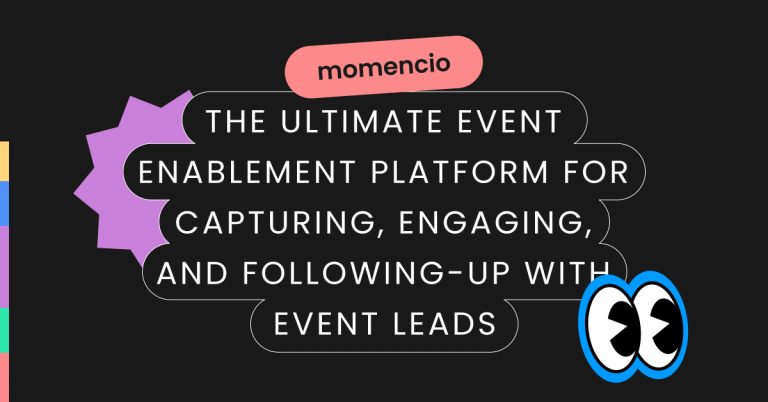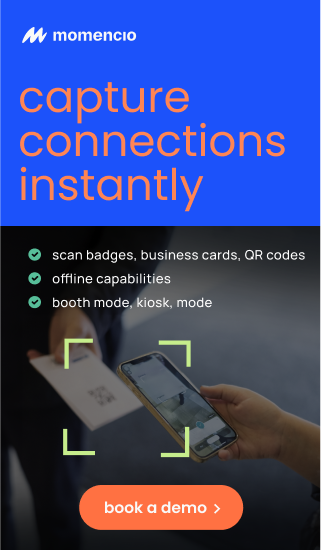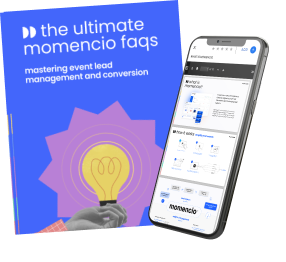Event professionals often face pressing questions like, “What is the best event management software?” or “How much does an event app cost?” These questions highlight the challenges in selecting the right solution amid a vast sea of available platforms. With over 87% of planners relying on software to streamline their processes, it’s clear that choosing the right tool is vital for success. This guide will help you address these concerns while providing clarity on how software can elevate your event strategy. Whether you’re organizing a virtual conference, a hybrid event, or a large-scale trade show, the right software can help you manage scheduling, budgeting, lead capture, and post-event analytics.
However, selecting the perfect platform from the plethora of options available takes a lot of work. How do you identify the solution that aligns with your specific needs and integrates seamlessly with your existing tools? This comprehensive guide is here to provide clarity. We’ll delve into the essential features to consider, compare leading platforms, and explain how software can revolutionize your approach to event management. By the end, you’ll be equipped with the knowledge needed to choose software that simplifies event planning, enhances engagement, and ultimately boosts your event ROI.
Key Features to Consider When Choosing Event Planning Software
When evaluating key features, event planners often ask, “What tools do event managers use?” and “What type of event planner makes the most money?” The answers lie in adopting tools that integrate comprehensive planning features, scheduling, analytics, and personalized engagement. Event professionals who use sophisticated tools for lead capture, follow-ups, and performance tracking often see higher ROI and profitability.
Selecting the right event planning software requires a strategic approach to meet your organization’s unique needs. Here are some of the crucial features you should consider:
- Comprehensive Planning Tools: An effective software solution should include tools for managing timelines, budgets, and resources. Look for platforms that offer seamless integration with your existing systems, such as CRMs or marketing automation tools. Comprehensive planning tools ensure you can manage every aspect of the event from one centralized hub.
- Scheduling Software for Events: Efficient scheduling ensures a smooth experience for both organizers and attendees. This feature enables planners to arrange sessions, workshops, and one-on-one meetings, allowing attendees to book and manage their schedules easily.
- Lead Capture and Management: Capturing and managing leads is crucial for maximizing ROI. The right software will offer badge scanning, customizable forms, and automated follow-up capabilities to ensure potential lead is turned in.
- Analytics and Reporting: Data-driven decisions improve the strategic impact of events. Real-time analytics and reporting provide insights into attendee behavior, engagement levels, and overall event performance. This data can help you refine future strategies for a better attendee experience and higher ROI.
- Gamification and Audience Engagement: Interactive elements, such as polls, surveys, and gamification, enrich the attendee experience while collecting valuable feedback. This feature fosters engagement and provides deeper insights into attendee interests.
- User Experience and Scalability: A user-friendly interface encourages better adoption and collaboration among teams. Additionally, as your organization grows, the software should scale alongside your evolving needs. Look for platforms with customizable features and the flexibility to adapt to new trends.
By focusing on these key features, you’ll be better prepared to select software that aligns with your strategic goals, ensures seamless event planning, and enhances attendee engagement.
The Role of Software in Streamlining Event Planning and Management
Event planning software serves as a critical partner in simplifying the many moving parts of event management, transforming what can be a complex process into a seamless operation. Here’s how software plays an essential role in optimizing the planning and execution stages:
- Automation of Repetitive Tasks: From sending invites to managing registrations, software automates tedious, repetitive tasks that otherwise require significant manual effort. Automated workflows not only minimize errors but also free up time for event professionals to focus on higher-level strategy and creative aspects.
- Centralized Collaboration: A centralized platform allows teams to collaborate in real-time, sharing schedules, budgets, and tasks across multiple departments and vendors. This unified collaboration reduces miscommunication, ensuring everyone remains on the same page regarding event goals and progress.
- Personalized Attendee Engagement: Personalization is vital for successful engagement. Modern software provides tools like targeted email marketing, curated session recommendations, and real-time communication features that help deliver a unique and tailored experience to each attendee. By tracking preferences and behaviors, you can craft customized follow-ups that strengthen relationships.
- Data-Driven Decision Making: Real-time analytics and reporting deliver valuable insights into attendee interactions, session popularity, and engagement levels. This data helps refine the content, marketing, and operational strategies, maximizing the value and impact of each event. Post-event analysis further aids in refining future strategies.
- Unified Lead Management: Event software enables seamless lead capture and management by integrating with CRM systems. From the initial interaction to post-event follow-ups, leads are meticulously tracked, scored, and nurtured. This integration ensures your sales and marketing teams can align their efforts and follow up on high-priority leads quickly.
- Scalability and Adaptability: The flexibility of modern software means you can scale your solutions to accommodate both small gatherings and large conferences. With the ability to quickly adapt to changing needs, your software can be a long-term partner in your evolving event strategy.
By understanding the full potential of event planning software, you can leverage its capabilities to elevate event performance, deliver exceptional attendee experiences, and achieve strategic goals effectively.
Tips for Assessing Needs and Scaling Your Software
Selecting and implementing the right event planning software is a strategic decision that requires careful assessment of your current needs and a forward-thinking approach to scaling.
Here are some tips to help you evaluate and scale your software solution effectively:
- Identify Current Pain Points: Before choosing software, it’s crucial to identify existing challenges and pain points. Do you need help with lead management, engagement tracking, or vendor coordination? Understanding these challenges will guide your selection of essential features, ensuring the software directly addresses your organization’s needs.
- Evaluate Key Stakeholder Requirements: Involve key stakeholders from various departments to gather a comprehensive list of requirements. Marketing may prioritize seamless CRM integration, while finance will focus on budgeting features. Creating a cross-functional checklist ensures you select a platform that meets the organization’s holistic needs.
- Assess Existing Technology Stack: Consider your existing technology stack and how the new software will integrate with your current systems. The event planning software should work smoothly with your CRM, marketing automation, and financial tools to provide a unified workflow across departments.
- Test for User Experience and Training Needs: Software adoption heavily depends on its user-friendliness. Opt for software that offers intuitive interfaces and robust support or training programs. Conduct trial runs with a few team members to gauge how easily the platform can be integrated into daily workflows.
- Choose Flexible, Scalable Solutions: Select a solution that offers flexibility and scalability to grow with your organization. This includes customizable modules, adaptable pricing structures, and features that accommodate future trends like hybrid events and AI-driven analytics.
- Prioritize Security and Compliance: Ensure that the software follows industry standards for data security and compliance, particularly if you’re handling sensitive attendee information. GDPR compliance and data encryption are essential considerations.
- Feature Comparison and Vendor Evaluation: Compare multiple platforms and their features to ensure you’re selecting the best fit for your specific requirements. Evaluate vendors based on customer support, platform reliability, and overall reputation.
- Plan for Implementation and Onboarding: Develop an implementation plan that includes a timeline, key milestones, and onboarding activities for different user groups. A well-thought-out onboarding process reduces adoption friction and ensures that the software delivers immediate value.
Cost is always a concern, and planners often ask, “How much does an event app cost?” To answer this, consider the total cost of ownership, including subscription fees, implementation, and support. Conduct a cost-benefit analysis to ensure the features offered align with your budget and scale as your events grow.
By following these tips, you’ll be able to choose event planning software that aligns with your current needs and provides a foundation for future growth, allowing you to scale your event strategy effectively.
Comparative Analysis: Finding the Right Fit
Selecting the right event planning software is not just about finding a feature-rich platform but choosing one that aligns with your organization’s goals and enhances your team’s workflow. Here’s a comparative analysis of some popular event-planning software solutions:
momencio
A comprehensive event management platform, momencio stands out for its emphasis on integrating lead capture and sales enablement. The software facilitates badge scanning, real-time engagement analytics, and seamless CRM integration. Ideal for event planners and marketers looking to bridge event engagement with post-event follow-up, its user-friendly interface makes it accessible for organizations of all sizes.
- Pros: Real-time lead management, robust analytics, seamless CRM integration, personalized microsites for targeted follow-ups.
- Cons: Focused more on B2B events.
The ability to convert event leads swiftly and effectively into successful business outcomes is paramount. Yet, many organizations need to grapple with outdated, fragmented lead management processes that hinder their ability to capitalize on event opportunities.
momencio is a revolutionary platform designed to bridge this gap, offering a holistic approach to event lead management and conversion.
If you want to know more about momencio and what it does, we answer all the important questions in a free ebook. Download it here
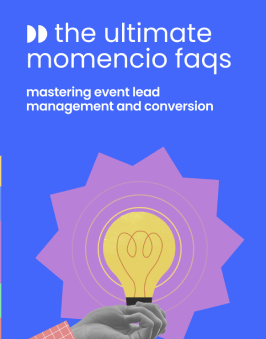
Cvent
Cvent is a popular platform known for its end-to-end event management features. It caters to large organizations seeking solutions that encompass everything from event registration to attendee engagement and reporting.
- Pros: Comprehensive features covering the entire event lifecycle, extensive vendor network, and event marketing capabilities.
- Cons: Complex for smaller organizations and less budget-friendly.
Eventbrite
Eventbrite specializes in ticketing and event registration, making it particularly suitable for small to medium-sized organizations with simple registration needs. Their platform is user-friendly and allows event professionals to manage virtual, hybrid, and in-person events easily.
- Pros: Simple to use, highly affordable, strong registration and ticketing features, broad integrations.
- Cons: Limited features for large events, less sophisticated analytics.
Bizzabo
Bizzabo offers a comprehensive suite of tools for event management, marketing, and analytics. With its focus on personalized attendee experiences, Bizzabo provides strategic insights into attendee behavior.
- Pros: Personalized marketing tools, strategic insights, flexible customization for large-scale events.
- Cons: Learning curve for new users, complex pricing structure.
Ringcentral Events
Ringcentral Events is a virtual event platform designed for organizations looking to host large-scale online events. It provides features like networking lounges, breakout rooms, and virtual exhibit halls.
- Pros: Virtual-first design, flexible networking and customization features, excellent attendee engagement.
- Cons: Limited for in-person events, fewer CRM integrations.
Each of these platforms has unique strengths and weaknesses. Your choice should align with your event size, attendee expectations, budget, and internal workflows. Consider starting with free trials or demos to get a first-hand feel of which platform integrates seamlessly with your event strategy.
Event planners may wonder, “What is the best platform for online events?” For those focused on virtual experiences, platforms like Ringcentral Events and Eventbrite excel in delivering high-quality networking and interactive features. Meanwhile, momencio remains a strong choice for bridging the gap between events and sales.
Interesting Facts from Research
- Event Technology ROI: Event planners using advanced technology for their events report a 20% increase in ROI compared to those relying on traditional methods.
- Lead Management Impact: Companies that effectively use lead management strategies see a 30% boost in revenue within six months of implementation.
- Hybrid Event Growth: Hybrid events have grown in popularity, with over 60% of planners adopting them due to their ability to engage a wider audience while maximizing attendee participation.
- Personalized Engagement: Event software with personalized engagement features, like targeted email marketing and microsites, results in a 50% higher conversion rate during post-event follow-up.
- Automation Efficiency: Automation of repetitive tasks saves event professionals up to 15 hours per week, which can be redirected to strategic planning.
Conclusion: Streamlined Event Planning with the Right Software
The right event planning software is instrumental in optimizing your approach to organizing and executing events. By understanding your organization’s current pain points and strategic goals, you can identify software that not only addresses your existing challenges but also scales with future growth.
Selecting comprehensive planning tools ensures seamless management of budgets, schedules, and resources. Meanwhile, real-time analytics empower event professionals to refine engagement strategies, personalize attendee experiences, and provide actionable insights that directly improve ROI. Integration with existing tools like CRM enhances collaboration between teams, ensuring that data flows smoothly from one system to the next.
Lead management and gamified engagement features streamline the follow-up process and keep the conversation going long after the event ends. Additionally, adaptable, user-friendly interfaces facilitate team adoption and drive efficient workflows.
Whether you’re managing an online event or a hybrid experience, choosing the right event planning software will help you elevate your event strategy, deliver exceptional attendee experiences, and achieve measurable success.
Book a Demo with momencio
Ready to take your event planning to the next level? Book a demo with momencio to experience how its comprehensive features—ranging from seamless lead capture to detailed analytics—will streamline your event management process and maximize your ROI.
FAQs – Event planning software
- What is the best event planning software?
- The best event planning software varies depending on your needs. Platforms like momencio excel in lead capture and engagement, while Cvent is ideal for comprehensive event management. Evaluate your specific requirements to determine the best fit.
- How much does an event app cost?
- Costs vary widely based on the platform’s features, the number of attendees, and the event type. Event apps can range from free basic tools to several thousand dollars for customized solutions. It’s best to compare different platforms’ pricing structures for an accurate estimate.
- What tools do event managers use?
- Event managers use various tools for different purposes, such as event planning software (for scheduling and budget management), CRM systems (for lead nurturing), analytics tools (for performance measurement), and marketing automation platforms (for personalized engagement).
- What is the best platform for online events?
- For online events, platforms like Ringcentral Events, Zoom Events, and Whova offer excellent virtual networking, breakout rooms, and exhibit halls. However, the best choice depends on your event’s specific requirements.
- How do event planners make money?
- Event planners typically make money through planning fees, commissions, sponsorships, and vendor partnerships. The exact model varies by the type of event and the services provided.
- What type of event planner makes the most money?
- Event planners specializing in large corporate events, luxury weddings, and international conferences often make the most money due to the scale and complexity of their events.
- How can event software improve attendee engagement?
- Event software improves engagement by offering features like gamification, personalized content recommendations, live polling, and virtual networking lounges. These tools create interactive experiences that keep attendees involved.
- How do you measure ROI with event software?
- Measure ROI by tracking metrics like attendee engagement, lead conversions, sales generated, social media reach, and attendee feedback. Most software provides analytics dashboards to simplify ROI measurement.
- Is CRM integration essential for event planning software?
- Yes, CRM integration is crucial for effective lead management and follow-ups. It ensures that all captured data syncs with your existing sales and marketing systems for seamless lead nurturing.
- How can event software help with post-event follow-up?
- Event software automates follow-ups through personalized emails, targeted microsites, and lead scoring systems. These features ensure that every lead is nurtured based on their interactions, improving conversion chances.
